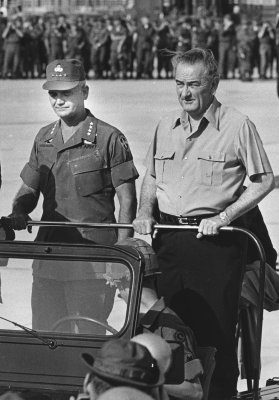Unknown Speaker: "I want more than any human being in all the world to see the killing stopped."
Robert Kennedy: "It should be clear by now that the bombing of the North cannot bring an end to the war in the South."
Unknown Speaker: "I saw about six bombs go off right amongst the two buildings that we were after."
Unknown Speaker: "(Unknown language.)"
Bill Reilly: “This is Bill Reilly in Danang, Vietnam, and I’ll be back in a moment with a look at a South Vietnamese Presidential Rally.”
Unknown Speaker: "We will negotiate without conditions, or we will negotiate about conditions, or we will discuss a final settlement."
Announcer: This is part of what Vietnam was all about in 1967. First there were increased and expanded air attacks on North Vietnamese targets by U.S. planes.
Unknown Speaker: "The main target for this morning's strike was the Lang Son railroad bridge about 10 miles south of the Chinese border. When I pulled off of my target, I looked back and observed the antipersonnel bombs going off all through our targets that I had been aiming for, and some had even spread out into another flag site over to the west. So I think we probably got one and damaged another."
Announcer: In Washington, the bombing was cause for debate by the hawks and the doves and everyone else. Senator Robert Kennedy of New York said the bombings didn’t accomplish anything.
Robert Kennedy: "Certainly the bombing of the North makes the war more costly and more difficult and more painful for North Vietnam. It’s a harsh punishment indeed, but we are not in Vietnam to play the part an avenging angel pouring death and destruction on the roads, in the factory, in the homes of a guilty land. We are there to assure the self-determination of South Vietnam, to fight the war effectively and to protect as many lives as we can. It should be clear by now that the bombing of the North cannot bring an end to the war in the South. And indeed at the present time it may well be prolonging that war."
Announcer: As in past years, this year there were many suggestions on how and why the war should be ended; why the United States should or shouldn’t be involved.
The United States offered several peace proposals in 1967; to all of them, Hanoi replied, “No.”
President Lyndon B. Johnson: "Our policy in Vietnam is the same. We are there to deter aggression. We are there to permit the people of South Vietnam to determine for themselves who their leaders should be and what kind of a government they should have. It is remarkable that a young country, fighting a tough war on its own soil, has moved so far so fast towards a representative government."
Announcer: Elections were held in September in South Vietnam. President Johnson sent observers, including New Jersey Governor Richard Hughes.
Richard Hughes: "I had occasion to talk to people in the armed services, some from New Jersey, and the same answer came back from everyone: no fraud, no duress, no pressure from the police or military authorities; and the mechanical propriety of the … of the election would have been evident to a blind man."
Announcer: Elected President and Vice-President, respectively, were Nguyen Van Chieu and Nguyen Cao Ky.
Announcer: Back in Washington, a problem. We’ll have that story after this message.











